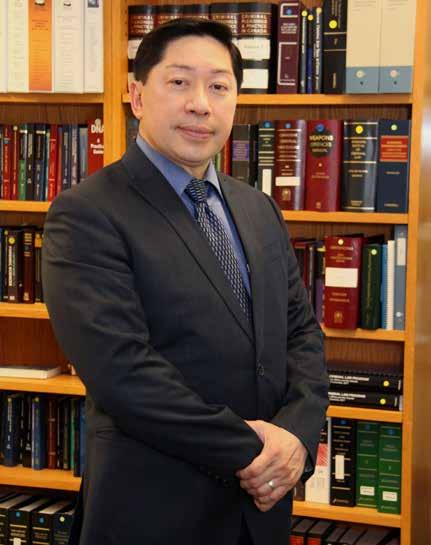
3 minute read
THE SLOW FASHION ADVOCATE
After more than two decades in the fashion industry, Daphne Woo is slowing down. Having spent much of her career working for some of the top global apparel brands, she’s now focused on producing sustainable textile art pieces at a smaller scale – an approach she says is more aligned with her values.
An advocate for slow fashion, Woo founded AMACATA Design Concepts to concentrate on craftsmanship that’s timeless, local and sustainable. Slow fashion is prepared with care and conscience, a process she says is time consuming but rewarding.
“Fast fashion is the second largest polluter in the world next to oil, and I wanted to bring attention to that aspect, in terms of the choices we make around consumerism,” she says.
Working as a natural dye artist, Woo creates decorative works for homes and galleries. She also spends some days naturally dyeing garments for clients, at times transforming wedding dresses into evening gowns. She says there’s a ceremonial aspect to this, refurbishing something old to new, to continue the garment’s legacy of positive experiences.
Woo’s interest in natural dyes traces back to her college days when she was introduced to them by an instructor while attending Capilano College. Later, for her graduation fashion line for the fashion design and technology program at KPU, she created naturally dyed lingerie and lounge wear.
“Working up towards the fashion show was quite an experience, getting it all together and also producing for it,” recalls Woo. “It taught me how to stick to deadlines and the importance of them. So, in that sense, it prepared me for what was to come.”
What followed were 20 years in the speedy-paced world of sportswear product development. After graduating from KPU in 1995, she worked for Vancouver-based Street Sport Manufacturing, which produced garments for Mountain Equipment Co-op and Mark's Work Wearhouse, among others. She moved to the Netherlands in 2003 and worked for Nike at its European headquarters, developing men's sportswear. She also worked at Asics on the 2010 Winter Olympics package. When she moved back to Vancouver in 2012, she took a job at lululemon, again in men’s sportswear. The roles involved overseas travel and collaboration with liaison offices and factories where the brand’s garments are produced.
In 2016, she participated in the social venture mentorship program at Groundswell Community, an alternative business school, where she focused on launching AMACATA as a social business. The name, she explains, is derived from the mirror image of ATACAMA, reflecting the raw, pure, natural properties of the desert. Today, Woo’s transition to a small business owner and artist has reignited her passion for textiles and art that originally drew her to the design program at KPU. She feels she has come full circle in her career.
“After close to 30 years, I've kind of come back to something that spoke to me already back then. It’s everything from working in the garden and being in harmony with nature, to producing art pieces that are aligned with my ethics and values.”
For Woo, providing natural fabric dyeing workshops and lessons in textiles is a way to share her knowledge and experiences with a new generation of enthusiasts. She says the movement towards natural materials and regenerative mindset is part of a bigger need for design students looking to incorporate sustainability and ethics into their education.
“I think the level that students are learning now is a lot more intense than when I was a student,” she says. “They’re very in tune with what's happening currently. The climate emergency is the big aspect right now. I think the biggest thing is that the students are very current, non-traditional, but still able to exercise their creativity.”
Increasingly, Woo is sharing a value-driven approach to fashion with her community. In 2021, she completed a community capacity building program and opened a nature-inspired show at Deer Lake Art Gallery, called Plant Parallels, with two other artists. She’s often asked to speak as a panelist and, most recently, spoke at Burnaby’s PechaKucha event.
She’s also sharing her perspective with the next generation through teaching. She developed a course on globalization and cultural differences for the fashion program at La Salle College that considers topics like ethics and cultural appropriation in fashion and taught a semester of textiles for fashion business students at JCI Institute.
All of this aligns with the intention of her art, which she describes as “advocating a cultural shift toward slowing down life’s pace, thus supporting socially and environmentally conscious living.”






